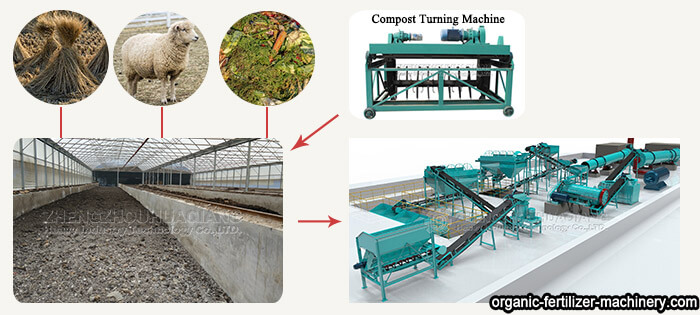Bio-organic fertilizer, with its advantages in improving soil and crop quality, has become a favorite in modern agriculture, and the fermentation process in the bio-organic fertilizer production line is the core guarantee of its quality. Many producers have a misconception: the longer the fermentation time, the better the quality of the organic fertilizer. In fact, bio-organic fertilizer fermentation has its own scientific principles, and excessive fermentation can be counterproductive.

Fermentation is essentially the process of microorganisms decomposing organic matter. Under suitable temperature, humidity, and aeration conditions, beneficial microorganisms decompose large molecules in raw materials such as straw and livestock manure, converting them into small molecules that crops can absorb, while simultaneously killing pathogens, insect eggs, and weed seeds. This process is usually divided into three stages: a heating period, a high-temperature period, and a cooling and maturation period, with a complete cycle generally lasting 20-45 days. Within this range, microbial activity is at its optimal state, maximizing the retention of nutrients and forming a loosely structured, stable-effect organic fertilizer. This is a key aspect that modern bio-organic fertilizer production lines need to control during production.
If the fermentation time is too long, it will enter a state of "over-composting." At this stage, the organic matter in the raw materials will be excessively decomposed by microorganisms, leading to a significant loss of organic carbon and the volatilization and loss of nutrients such as nitrogen, phosphorus, and potassium, directly reducing the nutrient density of the fertilizer. Simultaneously, excessive fermentation will raise the pH value of the organic fertilizer, causing salinization. Long-term application may disrupt the soil's acid-base balance and affect crop root development. Furthermore, extending the fermentation cycle increases energy consumption and labor costs, reducing production efficiency. This is especially true for enterprises relying on automated bio-organic fertilizer equipment; unnecessary cycle extensions can significantly increase production losses.
Judging whether fermentation has met standards cannot be based solely on the length of time; actual indicators must be observed: the material should turn dark brown or black, have a loose texture and no odor, maintain a stable temperature at room temperature, and have a pH value between 6.5 and 7.5. Producers should flexibly control the fermentation time based on the raw material ratio, fermentation equipment, and environmental conditions to ensure that the microorganisms complete effective transformation.
A scientifically sound fermentation cycle is key to balancing organic fertilizer quality and production efficiency. By abandoning the misconception that "the longer the better" and following the laws of microbial metabolism, we can produce high-quality and efficient bio-organic fertilizers, thus contributing to the sustainable development of agriculture.